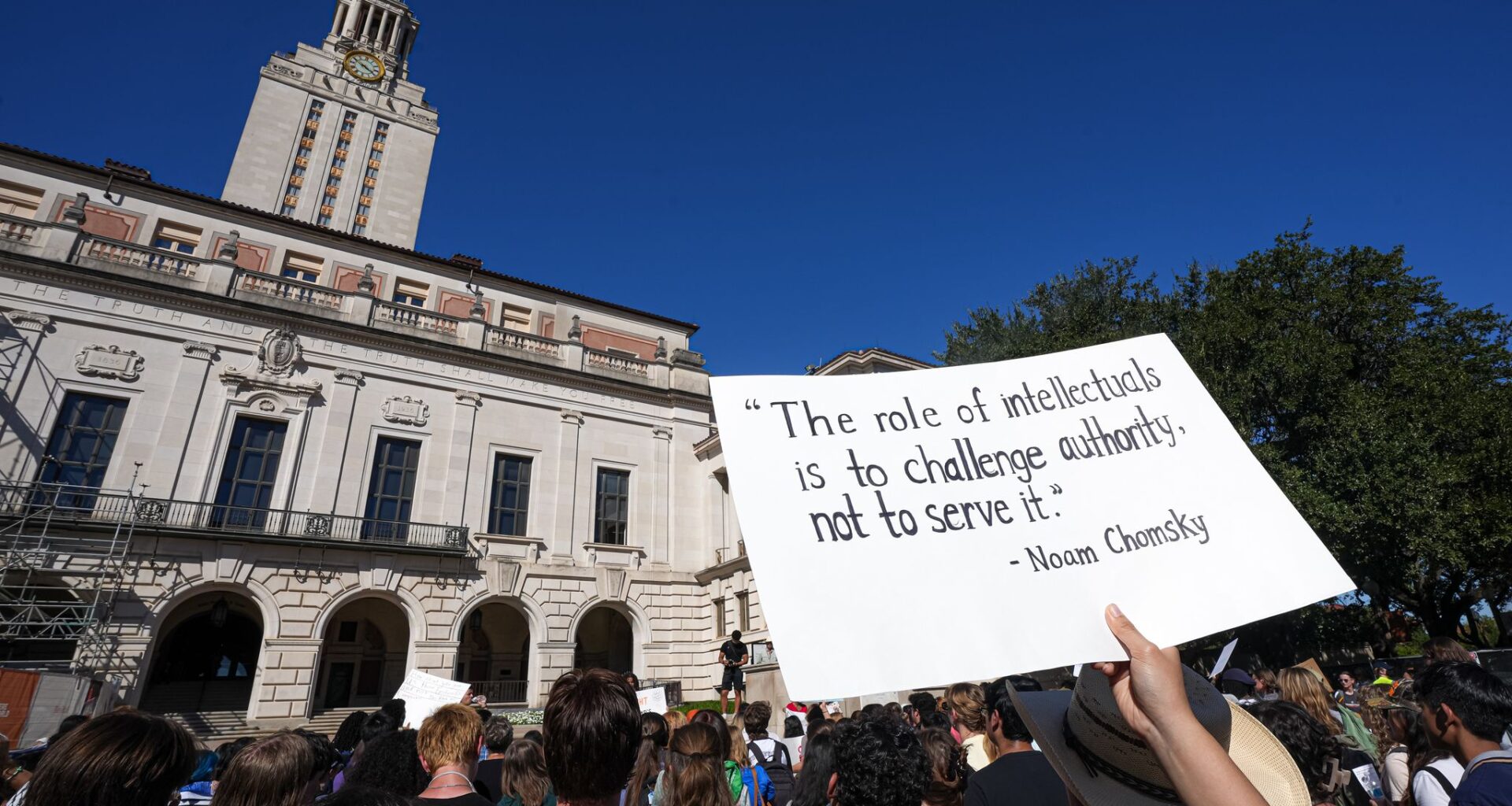A demonstrator holds up a sign at the base of the UT Tower during a protest at the University of Texas at Austin on Monday, October. 13, 2025. About 150 people gathered to protest Trump’s compact, which was sent to UT and eight other schools. If signed, UT will get exclusive benefits but also pledge to follow trump’s guidance.
Aaron E. Martinez/Austin American-Statesman
Officials at the University of Texas refuse to say whether they will accept a deal with the president’s administration in exchange for federal funding opportunities despite a key deadline passing — becoming the only institution that was offered the deal to not publicly indicate its decision or feedback.
Seven of the nine schools — offered money in exchange for promises to protect conservative voices, cap international student enrollment and teach that there are only two genders — rejected the terms. Vanderbilt University said publicly it was open to more discussion but has not accepted or rejected the deal. A spokesman for UT did not respond to questions asking about the school’s response, though the deadline to provide feedback to the presidential administration was Monday.
Article continues below this ad
President Donald Trump’s administration offered the deal, called “the Compact for Academic Excellence in Higher Education” to nine universities on Oct. 1, after which the University of Texas System “eagerly” jumped to review the terms. Since then, higher education organizations, students and faculty have warned that accepting the terms threaten academic freedom and university independence.
In a statement Oct. 2, UT Regents Chairman Kevin Eltife said UT was proud to work with the Trump administration at this “crossroads” moment and would immediately start reviewing the compact.
Though the flagship remained quiet throughout deliberations, UT leaders enacted their own reform on campus to confront the changing landscape of higher education, firing key leaders from their administrative appointments, launching a core curriculum committee to investigate how best to prepare students for civic and professional life and auditing classes in LGBTQ studies and other unspecified departments.
After four universities rejected the terms, the White House met virtually with higher education leaders, including the University of Texas, to discuss the compact ahead of the Oct. 20 deadline to provide feedback. The deadline to sign the compact is Nov. 21, according to a copy of the compact obtained through open records request.
Article continues below this ad
“The Administration is committed to a forward-looking vision of higher education that serves our nation by helping the next generation grow into resilient, curious, and moral leaders, inspired by American and Western values,” Vince Haley, Assistant to the President for Domestic Policy at the White House, emailed President Jim Davis Oct. 1, according to the records obtained.
‘Corrupting our youth’
The declining schools — and the critics who urged the rejection — said the compact would allow financial awards to be determined for allegiance to political priorities, not just merit of scientific research. Many acknowledged that they agreed with some of the Trump administration’s priorities but feared signing the compact is not the way to achieve excellence.
UT also already adheres to some principles in the compact, such as institutional neutrality; international student enrollment below 15%; and no diversity statements in hiring. Some UT students protested the compact last week, citing fears it would infringe on their institution’s freedom to teach and govern itself freely.
Article continues below this ad
READ MORE: ‘Do not sign’: UT students ask university to reject Trump proposal
In a Truth Social post Oct. 12, Trump accused higher education of “corrupting our Youth and Society with WOKE, SOCIALIST, and ANTI-AMERICAN Ideology that serves as justification for discriminatory practices” and said the compact would reform education.
Conservative Texas lawmakers championed such reform during the last two legislative sessions, banning diversity, equity and inclusion offices, hiring practices and staff in 2023. More recently, lawmakers restricted faculty senates and empowered governor-appointed regents with more control over curriculum, hiring and degrees in Senate Bill 37.
Gov. Greg Abbott took a greater interest in higher education this fall, urging the termination of a Texas A&M University professor for teaching about gender identity in a children’s literature course. The university’s president, dean and department head resigned or lost their appointments in the aftermath. Abbott also urged two universities to expel students who allegedly mocked the death of conservative activist Charlie Kirk.
Article continues below this ad
“Texas is targeting professors who are more focused on pushing leftist ideologies rather than preparing students to lead our nation,” Abbott said in a post on Sunday celebrating the termination of an academic affairs leader at UT. “We must end indoctrination and return to education fundamentals at all levels of education.”
The American Council on Education, a coordinating body for nearly 1,600 universities and colleges, signed a letter opposing the compact with 35 other higher education organizations.
Locally, the UT Austin Chapter of the American Association of University Professors voted to reject the compact, urging leaders to “defend UT’s independence, and uphold faculty’s and students’ academic freedom.” The AAUP is a professor’s union founded in 1915 with more than 500 national chapters.
Article continues below this ad
TURNOVER AT UT: ‘Inflection point’: leadership shakeups over ideological differences continue at UT
The AAUP chapter said it fears that accepting the compact will result in the “targeting of academic units that the Trump administration perceives as hostile to undefined ‘conservative ideas,’” such as classes that affirm the existence of transgender individuals. They also fear the tuition stipulations would impede the university’s control over its finances, the resolution states.
“Those who teach and study at UT Austin are worried,” the AAUP resolution on the compact stated. “The Compact reflects a grave threat to the mission of the University of Texas at Austin.”
Article continues below this ad

